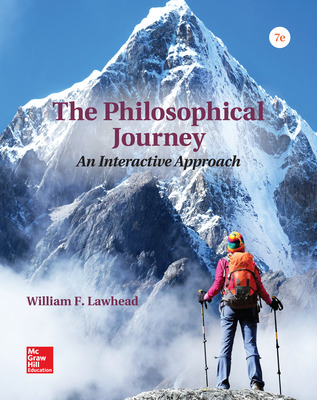Test Bank For The Philosophical Journey An Interactive Approach 7TH Edition By William Lawhead
Digital item No Waiting Time Instant DownloadISBN10: 1259914267 ISBN13: 9781259914263
In Stock
Original price was: $55.00.$28.00Current price is: $28.00.
Test Bank For The Philosophical Journey An Interactive Approach 7TH Edition By William Lawhead
The Philosophical Journey: An Interactive Approach, 7eCHAPTER 1: Introduction to the Philosophical JourneyCHAPTER 2: The Search for Ultimate RealityCHAPTER 3: The Search for KnowledgeCHAPTER 4: The Search for GodCHAPTER 5: The Search for Ethical ValuesCHAPTER 6: The Search for the Just SocietyCHAPTER 7: Philosophy and the Meaning of Life
The Philosophical Journey: An Interactive Approach, 7e (Lawhead)
Chapter 2 The Search for Ultimate Reality
1) Philosophical questions about the nature of reality fall under the heading of metaphysics.
Answer: TRUE
Accessibility: Keyboard Navigation
2) According to your text, a metaphysical idealist is a person who is very optimistic.
Answer: FALSE
Accessibility: Keyboard Navigation
3) Metaphysical materialism is a form of dualism.
Answer: FALSE
Accessibility: Keyboard Navigation
4) Your text said that fundamental reality is that upon which everything else depends.
Answer: TRUE
Accessibility: Keyboard Navigation
5) Hugh Elliot’s story of “Tantalus” was meant to illustrate the fact that thoughts are the product of a nonphysical mind.
Answer: FALSE
Accessibility: Keyboard Navigation
6) Descartes’s position on the mind-body issue is a form of metaphysical dualism.
Answer: TRUE
Accessibility: Keyboard Navigation
7) René Descartes was more certain about the existence of his mind than the existence of his body.
Answer: TRUE
Accessibility: Keyboard Navigation
8) Descartes believed that the mind and body interact in the pineal gland.
Answer: TRUE
Accessibility: Keyboard Navigation
9) David Chalmers argued that physicalism is false.
Answer: TRUE
Accessibility: Keyboard Navigation
10) According to your text, the principle of Ockham’s razor lends support to the dualist.
Answer: FALSE
Accessibility: Keyboard Navigation
Test Bank for “The Philosophical Journey: An Interactive Approach,” 7th Edition by William Lawhead
Overview:
- Title: The Philosophical Journey: An Interactive Approach
- Edition: 7th
- Author: William Lawhead
- Focus: This textbook offers a comprehensive introduction to philosophy through an interactive and student-centered approach. It explores fundamental philosophical questions and concepts, encouraging students to engage actively with the material.
Content Details:
- Introduction to Philosophy:
- Overview of the nature and scope of philosophy.
- Exploration of the major branches of philosophy: metaphysics, epistemology, ethics, political philosophy, and aesthetics.
- Discussion on the importance of critical thinking and reasoning in philosophical inquiry.
- Historical Perspectives:
- Examination of the contributions of key philosophers from ancient to modern times, including Socrates, Plato, Aristotle, Descartes, Kant, and Nietzsche.
- Exploration of various philosophical movements, such as empiricism, rationalism, existentialism, and pragmatism.
- Metaphysics:
- Exploration of fundamental questions about existence, reality, and the nature of the universe.
- Discussion on topics such as the mind-body problem, free will vs. determinism, and the nature of time and space.
- Examination of different metaphysical theories, including dualism, materialism, and idealism.
- Epistemology:
- Discussion on the nature and limits of knowledge.
- Exploration of skepticism, the theory of knowledge, and the problem of justification.
- Examination of the sources of knowledge, including perception, reason, and intuition.
- Ethics:
- Overview of major ethical theories, including utilitarianism, deontology, virtue ethics, and relativism.
- Discussion on moral dilemmas, the nature of moral responsibility, and the role of ethics in human life.
- Exploration of contemporary ethical issues, such as bioethics, environmental ethics, and social justice.
- Political Philosophy:
- Examination of the nature of political authority, justice, and the role of the state.
- Discussion on different political theories, including social contract theory, Marxism, and liberalism.
- Exploration of topics such as human rights, democracy, and the ethics of war and peace.
- Aesthetics:
- Exploration of the nature of beauty, art, and aesthetic experience.
- Discussion on different theories of aesthetics, including formalism, expressionism, and the philosophy of art.
- Examination of the relationship between art and society.
- Interactive Features:
- Case Studies: Real-life scenarios that encourage students to apply philosophical concepts to practical situations.
- Discussion Questions: Thought-provoking questions designed to stimulate classroom debates and individual reflection.
- Quizzes and Tests: A variety of question formats, including multiple-choice, true/false, short answer, and essay questions, to assess students’ understanding of the material.
Conclusion:
The test bank for “The Philosophical Journey: An Interactive Approach,” 7th Edition by William Lawhead, is an essential tool for instructors and students. It provides a wide range of questions that assess comprehension, encourage critical thinking, and facilitate a deeper understanding of philosophical concepts. By utilizing this test bank, students can enhance their learning experience and better prepare for exams in their philosophy courses.


Reviews
There are no reviews yet.